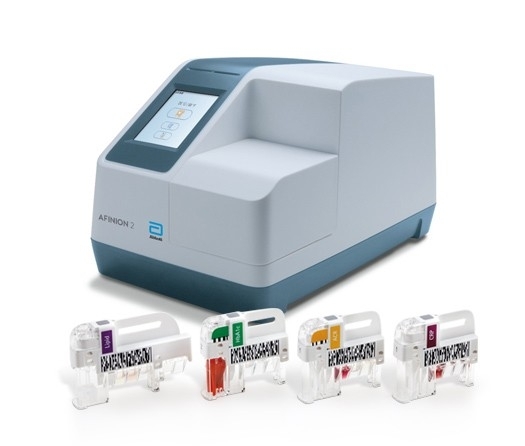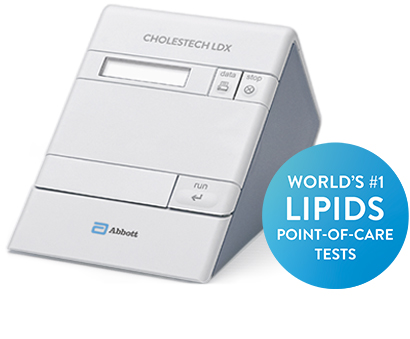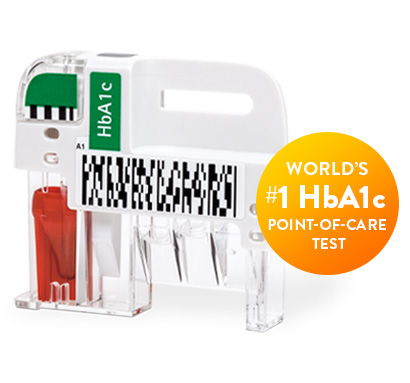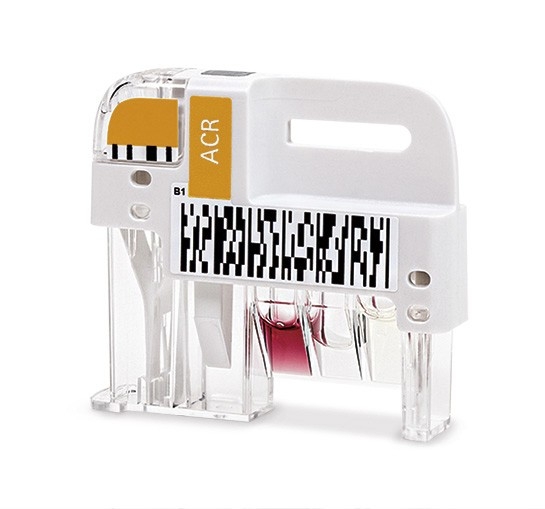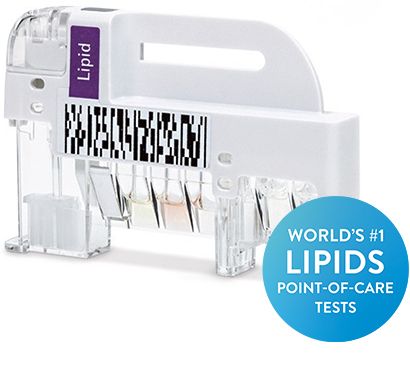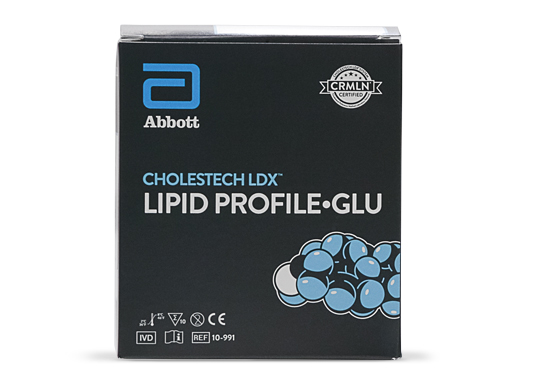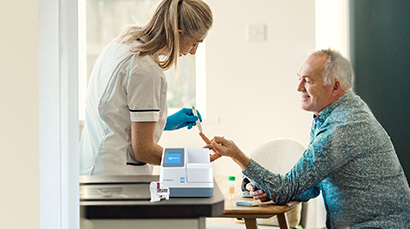Global point of care
Cardiometabolic Practice Solutions
Discover Abbott Practice Solutions for your Cardiometabolic patient management
Chronic cardiometabolic diseases are surging worldwide. For example, there are now over 400 million cases of diabetes — and that number will rise by more than 50% in the next 25 years.1 Although practice guidelines include testing for HbA1c, Lipids and ACR, fewer than 7% of patients are tested at the guideline recommended frequency and only 26.7% of patients are meeting targets for glycemic, blood pressure and cholesterol control.2,3 New, more efficient methods for handling this growing epidemic are needed.
Point-of care tests (POCT), such as rapid diagnostics from Abbott, have been shown to improve patient medical outcomes and practice efficiency.4
Your practice – with more success
Our rapid diagnostics enable you to perform important cardiovascular and metabolic tests at the point of care. Clinicians can obtain results and discuss a care plan with patients in the same visit. This leads to practice efficiency, strengthens the clinician-patient relationship, and motivates patients to better manage their condition.5
In a world with more pay for performance and more cardiometabolic burden, improved patient outcomes and increased practice efficiency can result in important economic benefits for your practice.
Our rapid diagnostics can also help your practice:
- Send fewer orders to central labs
- Free staff from chasing lab results
- Reduce the number of patients lost to follow-up
- Eliminate unnecessary follow-up appointments
- Become more adherent to guideline testing frequencies
- Improve patient satisfaction
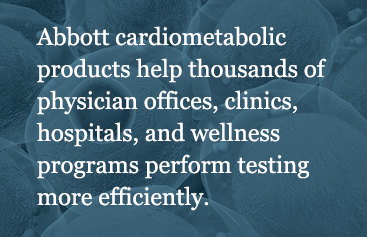
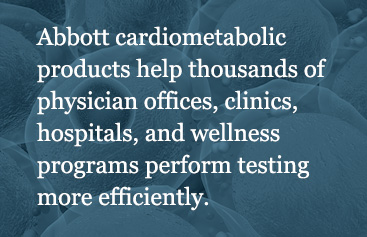

We are the world’s #1 provider of point-of-care testing products and can help you and your staff manage diabetes in your patients with better outcomes for everyone.



We are the world’s #1 provider of point-of-care testing products and can help you and your staff manage diabetes in your patients with better outcomes for everyone.



Our Cardiometabolic Chronic Care POCT Products
Explore our world-leading point-of-care solutions for cardiometabolic care
Simply more efficient
Eliminate wasted time and improve operational efficiency with Abbott rapid tests.
There’s no longer a need to send samples off to a lab, wait for results, and risk losing patients in the process. With our rapid diagnostics, patients can go from check-in to consultation in minutes.
With same-visit testing and consultation, losing patients to the lab is no longer a problem and visits can be more informative and productive with results in hand so time is not wasted. According to the Diabetes Study of Northern California, one in seven patients fails to complete laboratory tests within six months of receiving a provider referral.6
Our rapid diagnostics can help enhance operational efficiency by:
- Drastically decreasing the need for follow-up calls (by up to 89%4) and results letters (by up to 85%4)
- Reducing patient revisits by up to 61%4
- Studies have demonstrated that point-of-care testing (POCT) can significantly improve clinical operations with cost reductions through improved practice efficiency4
Streamline Workflow
Save steps, save time, and preserve lab accuracy.
One of the traditional barriers to point-of-care testing in the office has been the concerns associated with the complexities of testing, equipment maintenance, limited test menu and the quality of the on-site results. Rapid testing solutions from Abbott don’t just deliver actionable results in far less time than traditional methods. They are also extremely simple to use, require little if any maintenance and are factory calibrated making implementation easy.
All of this comes without sacrificing the quality of the results. Our rapid diagnostics deliver lab accurate results allowing clinicians to make confident diagnoses and treatment decisions.
Afinion™ HbA1c is consistently amongst the best performing systems on the US College of American Pathology and other proficiencies surveys, with best in class accuracy demonstrated several times over in multiple publications.7,8,9
Additionally, one study found that the Cholestech LDX™ System was as accurate as a large analyzer in a hospital or commercial laboratory.7 “The Cholestech LDX™ System provided LDL cholesterol assessment that was in as close agreement with the CRMLN [Cholesterol Reference Method Laboratory Network] laboratory as was the commercial laboratory.10
It is also critical that results collected at the POC make their way into the enduring electronic patient record. Our innovative web-based Abbott POC Data Management Platform comes together to give you better connectivity and diagnostics, anywhere.
Better Compliance and Control
Achieve a lower HbA1c, keep Lipids in check and monitor kidney function.
Getting your diabetes population under control is often complicated and costly. A comprehensive approach is necessary and point-of-care testing can be a critical part of the solution. The implementation of point of care testing has resulted in more guideline compliant frequencies of HbA1c testing and improved glycemic control.11
One study showed that just six months post-implementation of point-of-care testing for HbA1c there was a 27% increase in ADA compliant HbA1c testing and significant decreases in HbA1c levels (p = 0.008).12 Additional POC implementation studies have shown several times over that POC can help to reduce patient HbA1c levels.
Chronic kidney disease (CKD) is a major and growing health burden and the current rise in diabetes, obesity and ageing will further worsen this situation unless there is greater focus. The American Diabetes Association (ADA) recommends annual screening because identifying renal disease early — and monitoring it consistently — can make all the difference. We make it fast and easy — with laboratory quality point-of-care results — to help patients better manage their diabetes and prevent costly medical events in the future.
Having diabetes or high blood pressure increases your risk of cardiovascular disease (CVD). The good news is that it is in your control — starting with managing hypertension and diabetes. Time is our most valuable asset in the battle against CVD. The sooner you can diagnose the problem, the faster you can treat the patient. Our innovative diagnostics give you reliable and actionable results in the fastest possible timeframe. In all patients with diabetes, cardiovascular risk factors should be assessed at least annually. These risk factors include dyslipidemia, hypertension, smoking, a family history of premature coronary disease, and the presence of albuminuria.
Improved Patient Satisfaction
Point-of-care testing can boost patients’ confidence, commitment and compliance
With our rapid cardiometabolic diagnostics, medical staff can do accurate assays right in the office, clinic, retirement home or pharmacy, and get results in minutes. Researchers have found that this kind of timely, informed decision-making can lead to better patient understanding, compliance6 and satisfaction5 as well as a stronger patient-clinician relationship.
Patients have more confidence in point of care testing results than those that come from central labs.4 They also prefer the experience: sampling via finger-prick rather than via venipuncture, on-site testing, and receiving immediate feedback.4
Studies confirm that point-of-care testing also contributes to greater patient motivation and stronger doctor-patient relationships.5
Patients aren’t alone. Practitioners and device operators also report greater satisfaction with point of care testing than with traditional testing.13
EXPAND YOUR KNOWLEDGE
View References
- International Diabetes Federation. IDF Diabetes Atlas, 7th edition. Brussels, Belgium: International Diabetes Federation, 2015. Available at: http://www.diabetesatlas.org. Accessed on August 11, 2017.
- Lian J, Liang Y. Diabetes management in the real world and the impact of adherence to guideline recommendations. Curr Med Res Opin. 2014;30(11):2233–40.
- Ali MK, Bullard KM, Gregg EW, del Rio C. A cascade of care for diabetes in the United States: visualizing the gaps. Ann Intern Med. 2014;161(10):681-9.
- Crocker JB, Lee-Lewandrowski E, Lewandroski N, et al. Implementation of point-of-care testing in an ambulatory practice of an academic medical center. Am J Clin Pathol. 2014. 142: 640-6.
- Laurence CO, Gialamas A, Bubner T. Patient satisfaction with point-of-care testing in general practice. Br J Gen Pract. 2010;60(572): e98–e104.
- Moffet HH, Parker MM, Sarkar U, et al. Adherence to lab requests by patients with diabetes: The Diabetes Study of Northern California (DISTANCE) Am J Manag Care. 2011;17(5):339–44.
- College of American Pathologists (CAP) GH5 Survey Data. Updated 8/17. ngsp.org/CAPdata.asp
- International Federation of Clinical Chemistry and Laboratory Medicine: Network of Standardization of HbA1c. Certificate for Afinion Analyzer participating in IFCC HbA1c Certification Programme. June 1, 2018.
- Lenters-Westra, E. and Slignerland, R. Three of 7 Hemoglobin A1c Point-of-Care Instruments Do Not Meet Generally Accepted Analytical Performance Criteria. The American Association for Clinical Chemistry. 2014.
- Gialamas A, Yelland LN, Ryan P, et al.(2009) Does point-of-care testing lead to the same or better adherence to medication? A randomised controlled trial: the PoCT in General Practice Trial. Med J Aust 191(9):487–491.
- Accuracy of LDL Cholesterol Measured with a Point-of-Care System and at a Commercial Laboratory Assessed with Definitive Methods.
- Rust G, Gailor M, Daniels E. Point of care testing to improve glycemic control. Int J Health Care Qual Assur. 2008 ; 21(3): 325–335.
- Laurence CO, Gialamas A, Bubner T. Point-of-Care Testing in General Practice Final Report Jan 2009.

